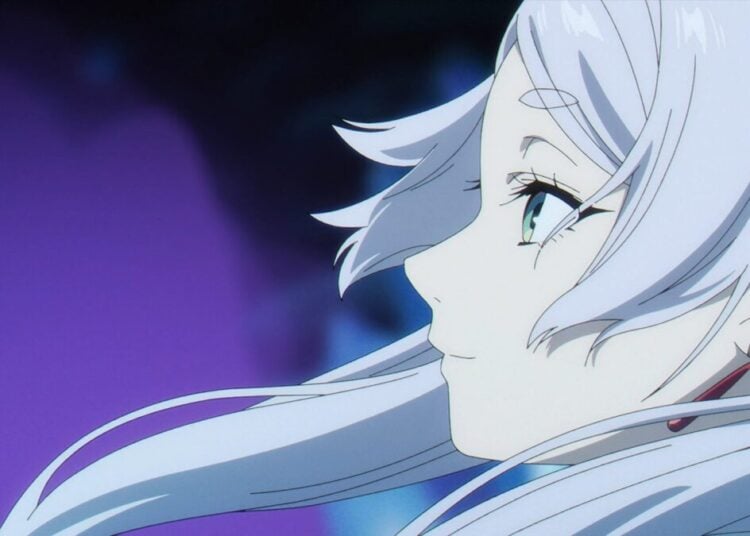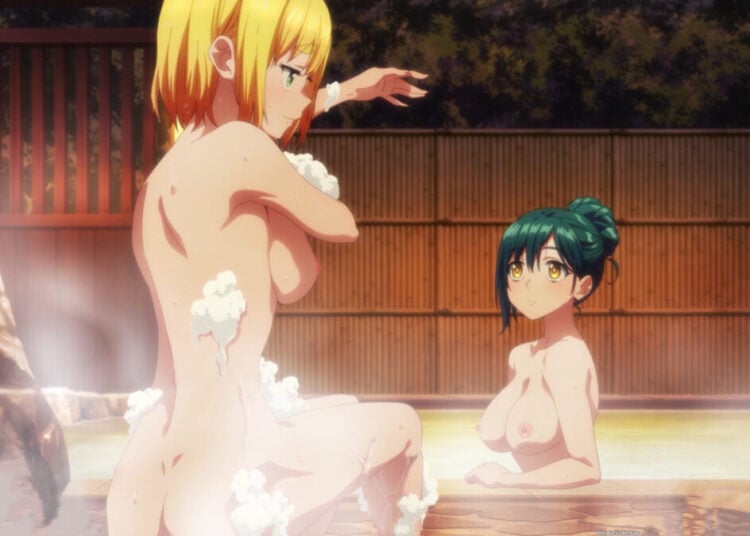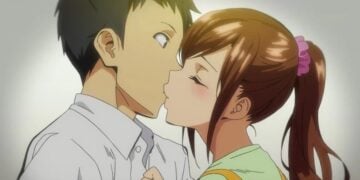Dr. Tanaka Yoshiki’s Legend of the Galactic Heroes (Ginga Eiyū Densetsu) has long been a benchmark for modern Japanese science fiction. While not as popular as its contemporaries, its blend of space opera and contemplation about human history has given it an enduring, timeless appeal. In this light, the first four parts of the latest adaptation, Die Neue These, are an ambitious mix of old and new that’s bound to entice a new generation of fans.
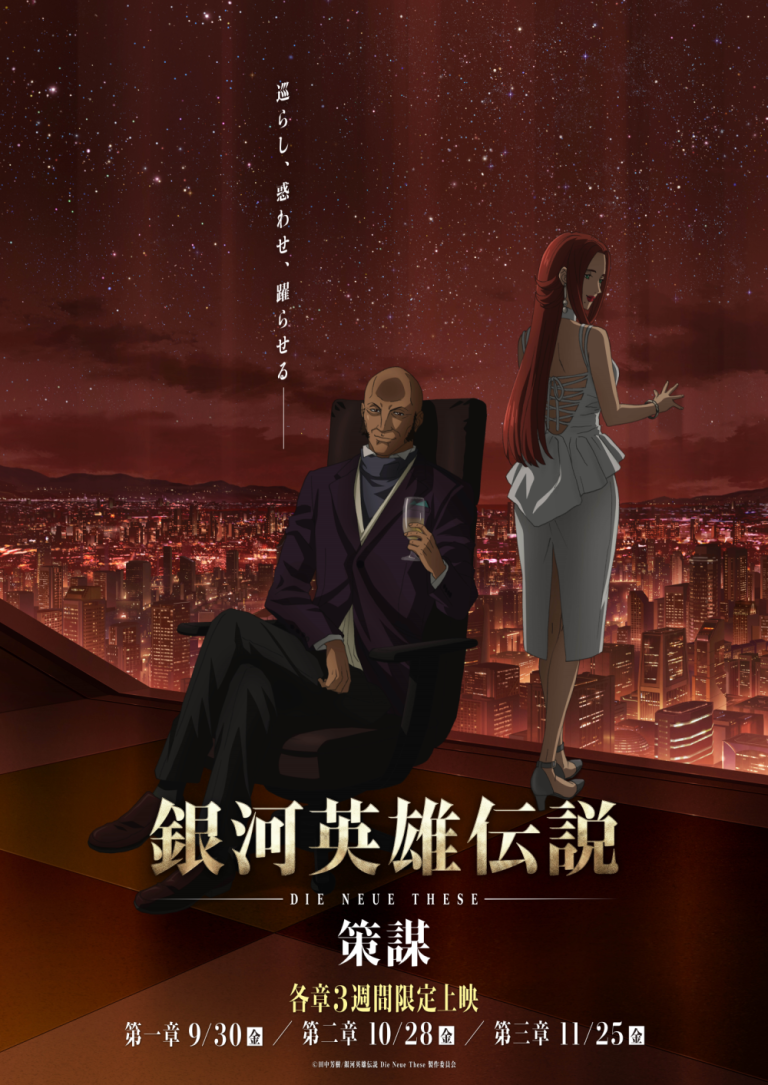
As of this article, Die Neue These comprises the following, each corresponding to the first four volumes of the source material:
- Encounter/Kaiko from April 2019 to June 2019 (12 episodes)
- Stellar War/Seiren from September 2019 to November 2019 (12 episodes in the form of three films)
- Collision/Gekitotsu from March 2022 to May 2022 (three films)
- Intrigue/Sakubō from September 2022 to November 2022 (three films)
Meanwhile, as touched upon in my beginner’s guide on LOGH a few years back, the series was touted as having some strong industry power when it was first announced in 2017. From the get-go, it has been directed by Shunsuke Tada, whose portfolio includes Space Battleship Yamato 2199 (2012-13), with fellow veteran Noburo Takagi serving as scriptwriter. On top of being produced by Production I.G., the project has had the backing of DMM Pictures, Shochiku, and Tokuma Shoten, which had published the original OVAs and the novels.
The Japanese trailer for the Intrigue/Sakubō arc does a good job showing both the changes and similarities between the classic OVAs and the new offering. (Source: YouTube)
With such lofty ambitions and a storied pedigree to live up to, does this glimmer brightly in the sea of stars, or is it is yet another ill-fated misfire?
Familiar Faces, Fresh Spin
Die Neue These chronicles the tail end of a long conflict between the heavily Germanic Galactic Empire and the superficially democratic Free Planets Alliance, in which even simple skirmishes lead to millions of deaths. Among the Imperial ranks is a young noble later known as Reinhard von Lohengramm (Mamoru Miyano, Aaron Dismuke) seeking to depose the ruling Goldenbaum dynasty and seize the universe justly. While on the other side, a brilliant if eccentric defender of democracy named Yang Wen-li (Kenichi Suzumura, Ian Sinclair) finds himself rising through the military despite his disdain for war, and for the corrupt politicians running the Alliance. Their exploits in time would change the course of human civilization, and they would become legends in their own right. Though as with all things in history, the deeds of men remain the same, from those leading the charge down to the nameless masses who live and die at their command.
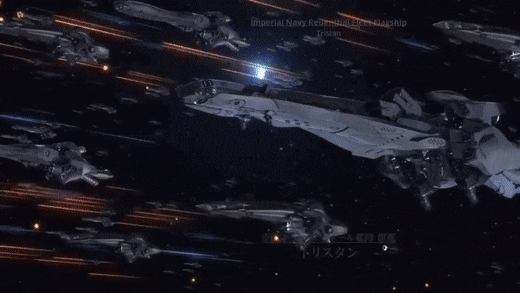
For fans of the classic adaptations — which collectively comprise the longest-running anime of its type ever made — it can feel simultaneously familiar and disorienting. There’s a noticeable shift in the aesthetics for one thing, be it the Empire’s blend of past and future being much more akin to 19th Century Prussia than the 18th Century, or the Alliance’s replacing its ’80s stylings with early 21st Century ones. Compared to the almost deliberately drawn-out OVAs, Production I.G.’s take also features faster pacing and is visibly dramatic. While this translates into fluid dialogue and tense sequences, it also comes at a cost. Like Yang’s lazy tendencies or the interactions among Reinhard’s subordinates, being downplayed, if not trimmed for time. Perhaps it’s the result of condensing an entire volume into the equivalent of 12 episodes, or maybe the inevitable outcome of treading into terrain covered by a revered epic: nothing quite feels as it ought to.
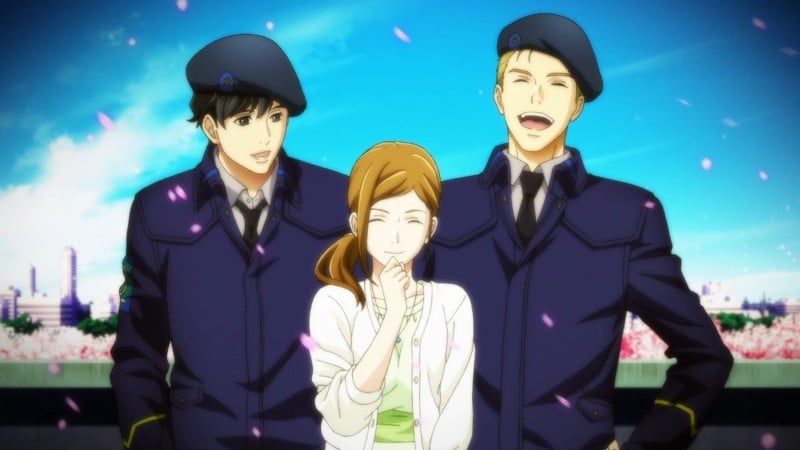
This might be unfair, however, as there’s more to Die Neue These. Among the key highlights of the anime is how, amidst all the differences, it strives to be “truer to the text” of the original novels. Whether it’s pivotal events such as how Reinhard’s best friend, Siegfried Kircheis (Yuichiro Umehara, Clifford Chapin) defeats the Castrop rebellion being recreated almost word-for-word, or the philosophical moments between Yang and his comrades being more casual than in-your-face, one gets a more focused tale that manages to be approachable to newcomers. The political scheming, large character roster — complete with helpful subtitles almost every time they show up — and historical allusions made famous by its predecessors remain as potent as ever, without feeling too overwhelming.
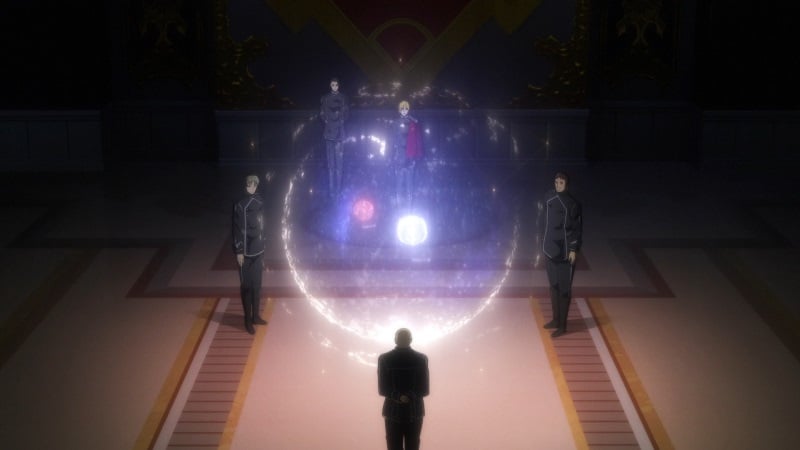
Only this time, they’re complemented by the greater attention placed on the characters themselves and how they fit into the setting. From changing how the Alliance’s Rosen Ritter are introduced so as to better highlight aspects of Frederich Greenhill (Aya Endo, Madeleine Morris) more vaguely alluded to in the OVAs, to showing Kircheis’ most memorable scenes with greater emotional weight, it makes them more relatable, with each triumph and harrowing death striking harder. Thus, though not quite as deep as the OVAs, it’s nonetheless a breath of fresh air.
Back to the Sea of Stars
Even with delays owing to networking issues asides, Production I.G. has pulled no stops with Die Neue These. While there’s copious use of CGI, be it in the myriad space battles — wherein abstract displays are juxtaposed with all the spectacle and carnage of war — or the glimmering sights of the planets Odin and Heinessen, these blend well with the detailed 2D art on display. Granted, the designs of the characters remain somewhat divisive even now among some older fans, with Reinhard in particular resembling a modern Bishounen protagonist instead of sporting a Wagner-inspired Shoujo look like in the OVAs. That said, these don’t distract from how distinct and consistent the overall quality is.
Without going too overboard, the anime puts its CGI and higher production values to good effect in ways that would have been harder to pull off in the ’80s. (Source: Youtube)
Then there’s the solid audio. Though still contentious among some due to going for a wholly original soundtrack as opposed to the classical music pieces used by the previous adaptations, it nonetheless holds its own. Sawano Hiroyuki’s mix of period, martial, and contemporary stylings, notably in his opening tracks, as well as sly nods to the OVA, is remarkably fitting with the tension and sweeping scope of the unfolding saga.
Even stronger, however, is the voice acting. Both the Japanese and English dubs do their best to give even more emotional weight to their respective characters. Put together with the rest of the changes, they do remarkably well in painting the source material in a new light.
Even to this day, there remain debates among fans over which adaptation is superior. (Source: YouTube)
With ambition, however, comes the risk of falling short, and Production I.G. has faced more than its fair share of hurdles in that regard. The inevitable comparisons with the classics didn’t do the studio any favors from the onset, whether over the creative decisions or the perception that the changes have robbed the material of their timelessness. On top of that, despite the esteemed standing of Legend of the Galactic Heroes, its very nature doesn’t make for high sales like more popular franchises. More cynical viewers might even wonder whether the studio’s plans of adapting everything could be sustained at all. Then again, the previous OVAs, done on a comparatively smaller budget over more than a decade, weren’t exactly profitable, either, yet still managed to build a fandom in due time.
https://twitter.com/AnimeKlipz/status/1601182031207366657
Perhaps history may be repeating itself. Enough of the story has been laid out in these first parts that more people have come to appreciate its strengths, further helped by how Die Neue These stands out from other seasonal shows by being a space opera. Within Japan, the anime’s gotten more visibility through various promotions and word-of-mouth, with the first volume of the Collision/Gekitotsu arc even ranking third in the Top 20 Weekly Blu-Ray and DVD charts in Japan in late August 2022. Meanwhile, despite its still muted attention overseas, the fact that it’s still being localized at all, both for the English-speaking world and beyond, is already a welcome surprise.
【「銀河英雄伝説 Die Neue These 策謀」第三章 舞台挨拶付き上映会:フォトリポート 】◆新宿ピカデリー/登壇者:宮野真守(ラインハルト役)、多田俊介監督/『僕は銀英伝説に参加出来て本当に幸せ 願うならばこの先もカイザー(ラインハルト)を演じたい!』◆⇒ https://t.co/J7rSH9gY1z #宮野真守 pic.twitter.com/GPRVdYlf3u
— Tokyo Borderless TV (@tbtvtwit) December 11, 2022
Although it remains to be seen if Production I.G. can keep this up, there’s more than enough for oldies and newcomers to enjoy. Still, what do you think?


